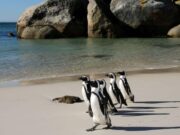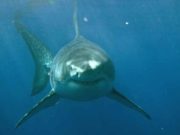From millions of African Penguins in the early 1900s, there are now only about 8,000 breeding pairs left
The African Penguin, the continent’s only penguin species, is now considered as a critically endangered species with a grim warning from an expert that if we don’t act timeously, we could lose Africa’s only penguin species within our lifetime.
In a decision announced on Monday28 October 2024, the International Union for the Conservation of Nature (IUCN)has elevated the bird’s risk of extinction status to “critically endangered. There are 18 penguin species globally, and the iconic African Penguin is the first to meet the criteria for this classification – just one rank below the “extinct in the wild” category.

The African Penguin has been raised from “endangered” to “critically endangered” because its population is undergoing an extremely rapid decline, mainly due to the encroaching demands on its food source. Apart from these food shortages, other contributing factors to the decline in the African Penguin population are the historic egg collection and guano harvesting on their breeding islands, oil pollution, increased maritime traffic as well as competition with and predation by Cape fur seals.

The legal proceedings between BirdLife South Africa, SANCCOB, and the South African government overfishing zones highlight an urgent conservation issue. African penguins, rely heavily on anchovies and pilchards to sustain their populations. However, these food sources are under intense pressure from commercial fishing activities. Closed fishing zones around penguin breeding areas would allow fish stocks to recover and provide a consistent food supply for penguins, particularly during their breeding season. Clearly, this situation underscores broader concerns about marine ecosystem health, as declining penguin populations are indicative of wider disruptions in oceanic food chains caused by overfishing, climate change, and habitat degradation.

Despite decades of research and public awareness, the species continues to decline, primarily due to human-driven factors like overfishing, habitat degradation, and climate change. The plight of the African penguin exemplifies a much larger crisis in biodiversity. If such a recognizable and studied species is at risk, it raises concerns about the fate of less visible organisms that play equally critical roles in ecosystems. Efforts like establishing marine protected areas, promoting sustainable fishing practices, and mitigating climate impacts are essential steps to address this crisis. The African penguin’s struggle serves as a stark reminder of the interconnectedness of ecosystems.
African Penguins as an Economic Asset
The African Penguin is not only an ecological treasure but also a significant economic driver for South Africa. According to a recent report, the species contributed an estimated R2 billion to R4.5 billion to the national economy in 2023, primarily through tourism. Iconic colonies, such as the one at Boulders Beach near Simon’s Town, generated R95 million in entrance fees alone, underscoring the penguin’s role in attracting both local and international visitors.

Beyond direct economic contributions, the African Penguin also holds immense emotional and cultural value. Many people derive satisfaction from knowing these colonies persist in the wild, a benefit reflected in their stated willingness to pay for conservation efforts. This “existence value” underscores how deeply biodiversity resonates with human well-being, even for those who may never visit the colonies in person.
Bottomline:
In its response, the Endangered Wildlife Trust says the report’s findings underscore the urgent need for targeted conservation measures that protect the African Penguin species and maintain the benefits they provide. The African Penguin represents more than a species on the brink of extinction—it symbolizes the broader struggle to preserve biodiversity in the face of environmental degradation.

Investing in their survival is not just about saving penguins—it’s about securing the future of South Africa’s natural heritage and the interconnected systems that sustain life on Earth.











